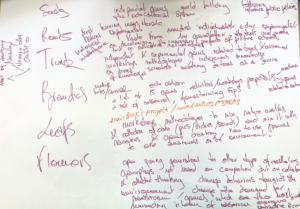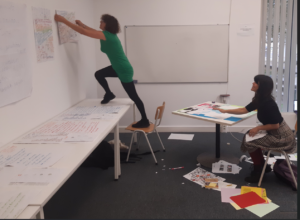During our residency at Anaïs Berck in 2022, artists and curators Livia Diniz and Isabelle Arvers developed FA Fractal from the Future, a speculative and collaborative tool inspired by the Yoruba divinatory practice of FA.
Drawing on Indigenous knowledge systems, play-based methodologies, and decolonial approaches, they created a magical, non-digital game-algorithm designed to remix their artistic research into new collaborative pedagogies, notably the GreenGames pedagogic kit.
Here is the document we produced in the frame of the residency:
GREEN GAMES PEDAGOGICAL KIT

Seeds: indépendant games, influence public policies and the educational system.
World building.
Roots: first native learning ways rituals and anarchist individualist educational
experimentations our texts on pandemic dreams and on decolonizing the
imaginary
Paolo Freire. Jeremy Nearby and Viveiro de Castro on the paradigm change. Our
projects on the future of schools. Biological intelligence.
Trunk: a corpus of 5 to 10 experimental, indépendant and artistic games related to
trees and to the preservation of the environment. Workshops methodologies
influenced by indigenous knowledge on trees and scientist working on trees as a
source of knowledge.
Branches: creative hubs and carnival. A list of games ( that can be downloaded
from platforms like itch.io ou sur steam) Activities workshops on games or
Machinima – films made with games – connected to walks in forests and
integrating environmental elements A list of ressources Gamestorming tips to
facilitate these activities.
Leaves: workshops methodologies to mix walks and collection of natural data –
sounds, pictures, videos – in narratives and games creation. How to use games to
raise awareness on climate change and on forest and environment preservation.
Flowers: to open new generations to new kinds of games aesthetics, gameplays,
narratives, not based on competition, but on collaboration and collective thinking.
To change behaviors towards the environment. To change the demand of games
and mitigate the power of mainstream games on imposing values and
representations but also which are the most demanding in terms of energy,
ressources of extractive economy and producing most of the e-trash.
This evolving toolkit integrates rituals, ancestral intelligence, environmental awareness, and children’s knowledge into participatory workshops that blend game creation, machinima, and speculative storytelling with environmental activism and postcolonial critique.
Blending theoretical insights from our published works (Pandemic Dreams Archive and Decolonizing the Imaginary through Machinima), we explored how alternative knowledge systems—rooted in Indigenous cosmovisions, animism, and affective technologies—can challenge extractive and anthropocentric models of learning and technology. Through rituals, algorithmic divination, and experimental uses of AI, we interrogated their own practices while envisioning futures where tools like machinima and dreaming archives activate interspecies collaboration, decentralized narratives, and plural epistemologies. Our journey, including guidance from a Vodou priest, revealed the deep ethical considerations and necessary spiritual engagements involved in working with sacred practices, ultimately affirming their commitment to respectful, transformative co-creation.
Our first public presentation of the project was on October 22 2022:

Demander à ChatGPT

Comments are closed.